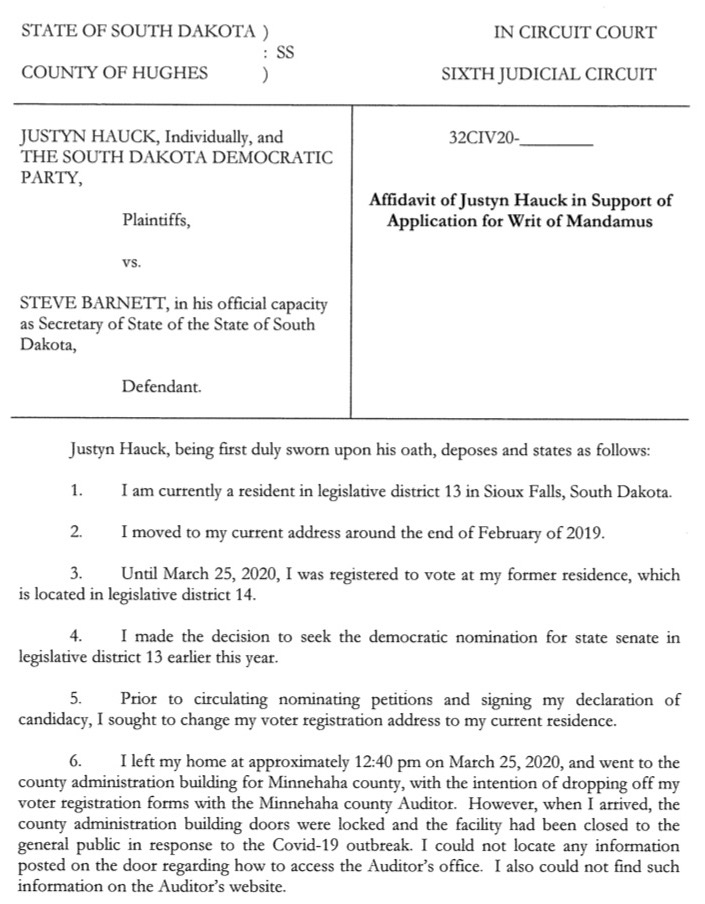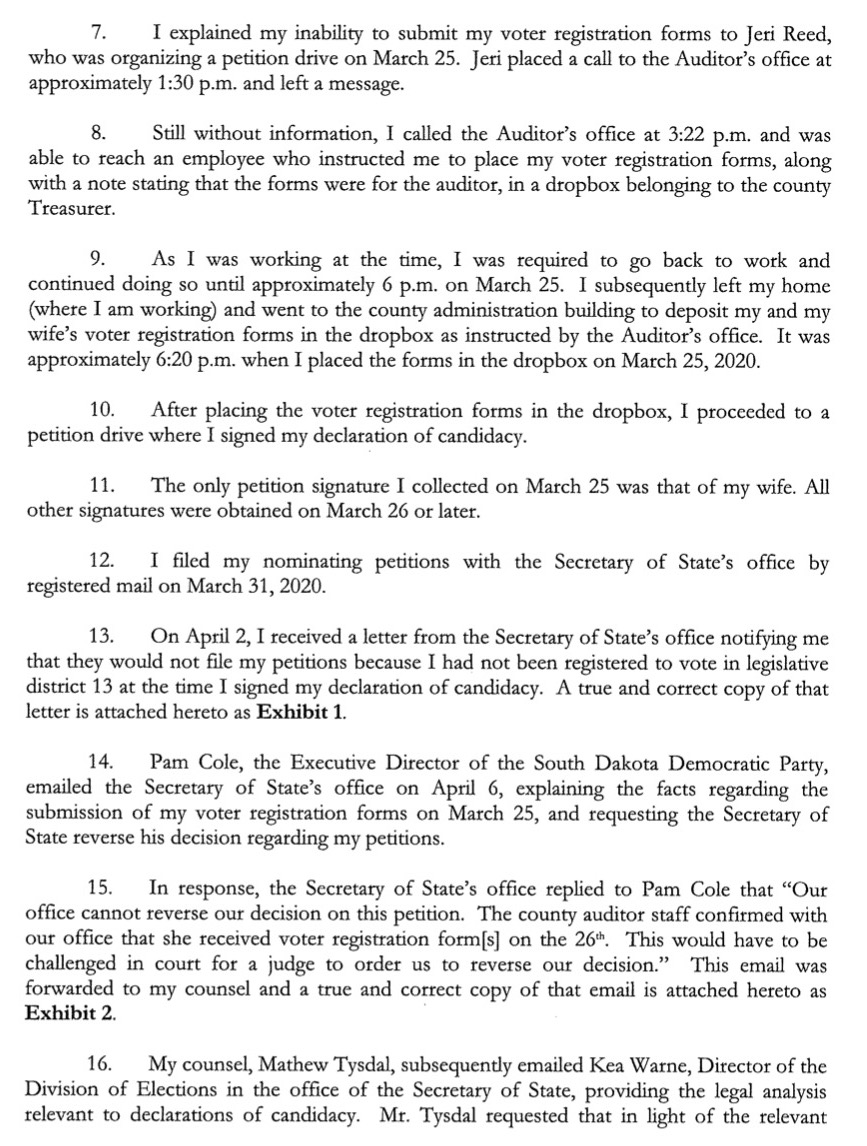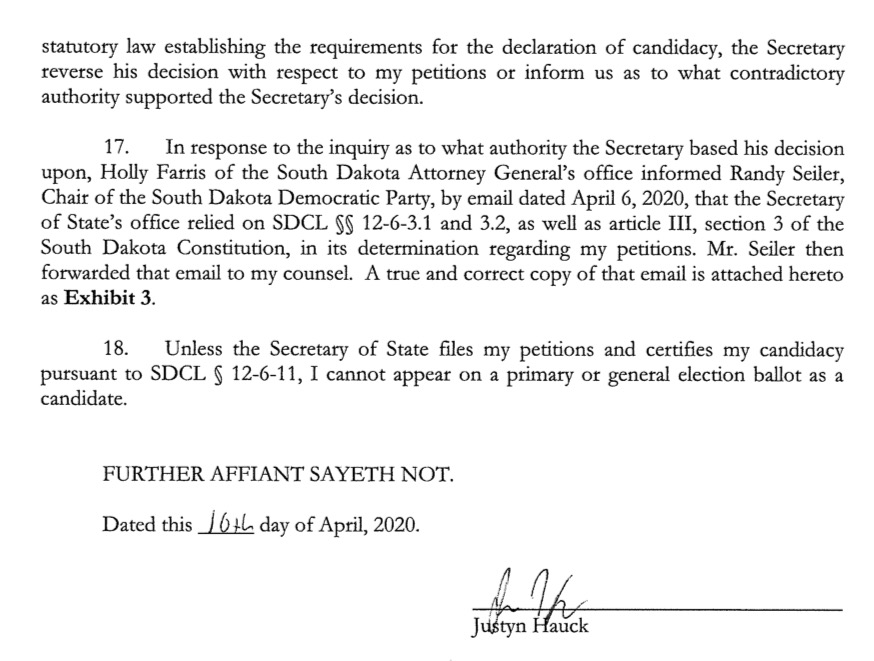Last updated on 2020-05-29
A technicality involving residency and voter registration disqualified 2018 District 14 Senate candidate Justyn Hauck from running for District 13 Senate this year. Hauck and the South Dakota Democratic Party are now suing to reverse that disqualification.
In his affidavit to Circuit Court, Hauck explains that he moved from District 14 to District 13 last year but didn’t go to change his voter registration until March 25, the day he planned to start circulating his petition. When he went to the courthouse over the noon hour, he found the building locked down for coronavirus, and he couldn’t get any info from the auditor’s office until later in the day on how to submit his voter registration information. He placed his registration form in a lockbox outside the courthouse after hours on March 25, signed his declaration of candidacy on his petition, collected one voter signature—his wife’s—that evening, collected more signatures on following days, and submitted his completed petition by registered mail to Secretary of State Steve Barnett on March 31.



On receiving Hauck’s petition, the Secretary of State’s office checked Hauck’s voter registration and found that the Minnehaha County auditor received and processed his voter registration form on March 26. The Secretary of State thus concluded that on March 25, the day Hauck signed his declaration of candidacy, he was not a registered voter in District 13, thus invalidating his declaration of candidacy and his petition.
Hauck says horsehockey, and so does the state Democratic Party, as explained in this legal brief:
Hauck and the SDDP’s challenge rests on a close reading of the statutes relating to nominating petitions and the declaration of candidacy. The declaration itself, as prescribed by Rule 05:02:08:01, reads thus:
I, ____________________________ (print name here exactly as you want it on the election ballot), under oath, declare that I am eligible to seek the office for which I am a candidate, that I am registered to vote as a member of the ________________ party, and that if I am a legislative or county commission candidate I reside in the district from which I am a candidate. If nominated and elected, I will qualify and serve in that office [Declaration of Candidate for partisan nomination petitions, SD Administrative Rule 05:02:08:01, last revised 2019].
That declaration rests on the authority of two statutes. SDCL 12-6-3.1 requires that Legislative candidates live where they are running to serve at the moment they sign their declarations:
Any candidate for office in the State Legislature shall be a resident of the district for which he is a candidate at the time he signs his declaration of candidacy as required by this chapter.
SDCL 12-6-3.2 requires that a candidate declaring a partisan candidacy be registered to vote as a member of that party:
No person may sign a declaration of candidacy or be nominated as a political candidate for a party unless that person is a registered voter with that party affiliation.
Hauck and the SDDP argue that Hauck met those two criteria:
- On March 25, Hauck resided in District 13.
- On March 25, Hauck was a registered Democratic voter.
This argument rests on a separation that challenges our daily assumptions. We generally assume that one is registered to vote where one lives. But South Dakota law has no mechanism to automatically update voter rolls the moment a voter moves to a new address. No statute negates voters’ registration the moment they sign a mortgage and take the keys to their new house from their realtor. Hauck’s technical response to Secretary Barnett’s technical rejection of his petition is technically correct: on March 25, Hauck lived in District 14, and he still held a valid voter registration as a Democrat.
Of course, this argument could get scary if we check the implications for other hypotheticals. Suppose an SDSU student from Minnesota takes an interest in South Dakota politics and agrees to run for Legislature. The student resides in Brookings, and the student holds a Minnesota voter registration. Can that student sign a declaration of candidacy for District 7 Senate?
To beat this challenge, the state will need to rebut the plaintiffs’ decoupling of residency and voter registration. If we had a competent attorney general, he might offer this response:
- SDCL 12-6-3.2 says a signer of a declaration of partisan candidacy must be “a registered voter with that party affiliation.”
- SDCL 12-1-3(21) says a “voter” is “a person duly registered to vote….”
- SDCL 12-4-1 says a person can be duly registered—or, in this statute, “be entitled to be registered”—only “in the voting precinct in which he resides.”
- SDCL 12-1-4 defines residence for voting purposes as “the place in which a person has fixed his or her habitation and to which the person, whenever absent, intends to return.”
- At the time plaintiff Hauck signed the declaration, the plaintiff resided in District 14. He had fixed his habitation there in 2019, with no intent to return to his previous domicile in District 13.
- On March 25, 2020, the plaintiff was entitled to be registered only in his voting precinct in District 14.
- On March 25, 2020, the plaintiff was not duly registered to vote and thus was not a legitimate voter. His voter registration was invalid.
- Thus, on March 25, 2020, the plaintiff was not legally a registered voter in the Democratic Party and thus was not legally qualified to sign a declaration of candidacy for a District 14 Legislative seat.
This defense argument finds some support in a case the plaintiffs footnote in their brief and which I blogged about back in 2008, Heinemeyer v. Heartland, in which my old Madison neighbor Jeff Heinemeyer tried to maintain his eligibility for a seat on the Heartland Consumer Power District board. Heinemeyer had moved out of Madison, which was part of the district whose Heartland seat he sought, and out to swankier digs by Lake Madison. Heinemeyer re-registered to vote in Madison at the address of my pal Lonnie Lembcke’s downtown Madison apartment. Heinemeyer justified his residency claim by chipping in on Lembcke’s rent, getting mail there, and occasionally eating lunch and napping there. The South Dakota Supreme Court said bonk on that:
Prior to November 1, 2006, Heinemeyer was living at his home at 927 Jennifer Street in Madison, South Dakota. Since this was the only residence Heinemeyer kept at the time, this was in fact his voting residence. On November 1, 2006, Heinemeyer relinquished possession of his home at 927 Jennifer Street to the purchasers of that home and moved to the new home he built at 27 Golf Drive in Wentworth, South Dakota. On November 1, 2006, Heinemeyer ceased to actually live in his home in Madison. Heinemeyer effectively gained voting residence at his home in Wentworth on November 1, 2006, because he began actually living in his Wentworth home. Thus, on November 1, 2006, Heinemeyer removed himself from District 10 and established his voting residence at 27 Golf Drive in Wentworth [South Dakota Supreme Court, ruling, Heinemeyer v. Heartland, 2008.11.12].
In Heinemeyer, in its statement that one gains voting residence upon moving, the court implies that one loses voting residence in one’s former abode and thus invalidates one’s former registration. Heinemeyer claimed to be a voter in the district he wanted to represent, as required by the statute governing consumer power district board qualifications, but the court said he was not a voter in that district, despite the existence of Heinemeyer’s voter registration form.
If the courts apply the Heinemeyer test to Hauck’s case, Hauck loses. Under Heinemeyer, your voter registration is not valid if you don’t really live in the district.
But Jason Ravnsborg won’t make that argument, one, because he’s a knucklehead, but two, because the SDGOP won’t let him. Argue Heinemeyer too loudly, and you disenfranchise all those RV voters who create an even thinner fiction or residency than Heinemeyer did, just for the pleasure of dodging taxes and high RV license and registration fees… and the people with the time, money, and inclination to prioritize such choices tend to vote Republican.
No other Democrat filed for District 13 Senate, so there’s no rush for the court to resolve this matter before primary voting starts (and jeepers, the Secretary as surely already sent those ballots for printing, right?). But watch for the state’s response to this truly interesting test of South Dakota’s interpretation of residency and voter registration.